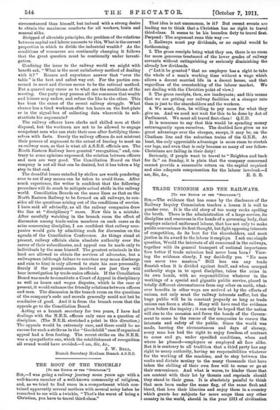THE ROOT OF THE TROUBLE?
[To THE EDITOR OF THE "SPECTATOR."]
was going a railway journey some years ago with a well-known member of a well-known community of religious, and, as we tried to find room in a compartment which con- tained apparently several mothers with several noisy babes he remarked to me with a twinkle, " That's the worst of being a Christian, you have to travel third-class." That idea is not uncommon, is it ? But recent events are leading me to think that a Christian has no right to travel third-class. It seems to be his bounden duty to travel first. Perpend : The argument runs this way :— 1. Railways must pay dividends, or no capital would be forthcoming.
2. The gross receipts being what they are, there is no room for more generous treatment of the lower grades of railway servants without extinguishing or seriously diminishing the already low dividends.
(" Let it be granted" that no employer has a right to take the whole of a man's working time without a wage which allows a decent married life in a decent house, and that regardless of the overstocking of the labour market. We are dealing with the Christian point of view.) 3. The gross receipts, then, are inadequate; and this means that we are getting our railway facilities at a cheaper rate than is just to the shareholders and the workers.
4. We must, then, be willing to pay more for what they give us. And we need not wait for this to be done by Act of Parliament. We must all travel first-class ! Q.E.D.
It is nonsense to say that this would be spending money extravagantly upon ourselves. The doubled fare gives us no great advantage over the cheaper, except, it may be, on the Chatham line and the suburban trains of the G.E.R. At least, the only appreciable advantage is more room to stretch our legs, and even that is only because so many of our fellow- Christians are failing in their duty !
Seriously, if people want to travel to " Brighton and back for 3s." on Sunday, it is plain that the company concerned cannot provide a reasonable return on the capital required and also adequate compensation for the labour involved.—I






























































 Previous page
Previous page